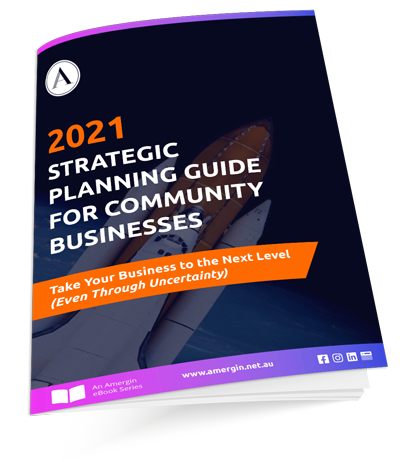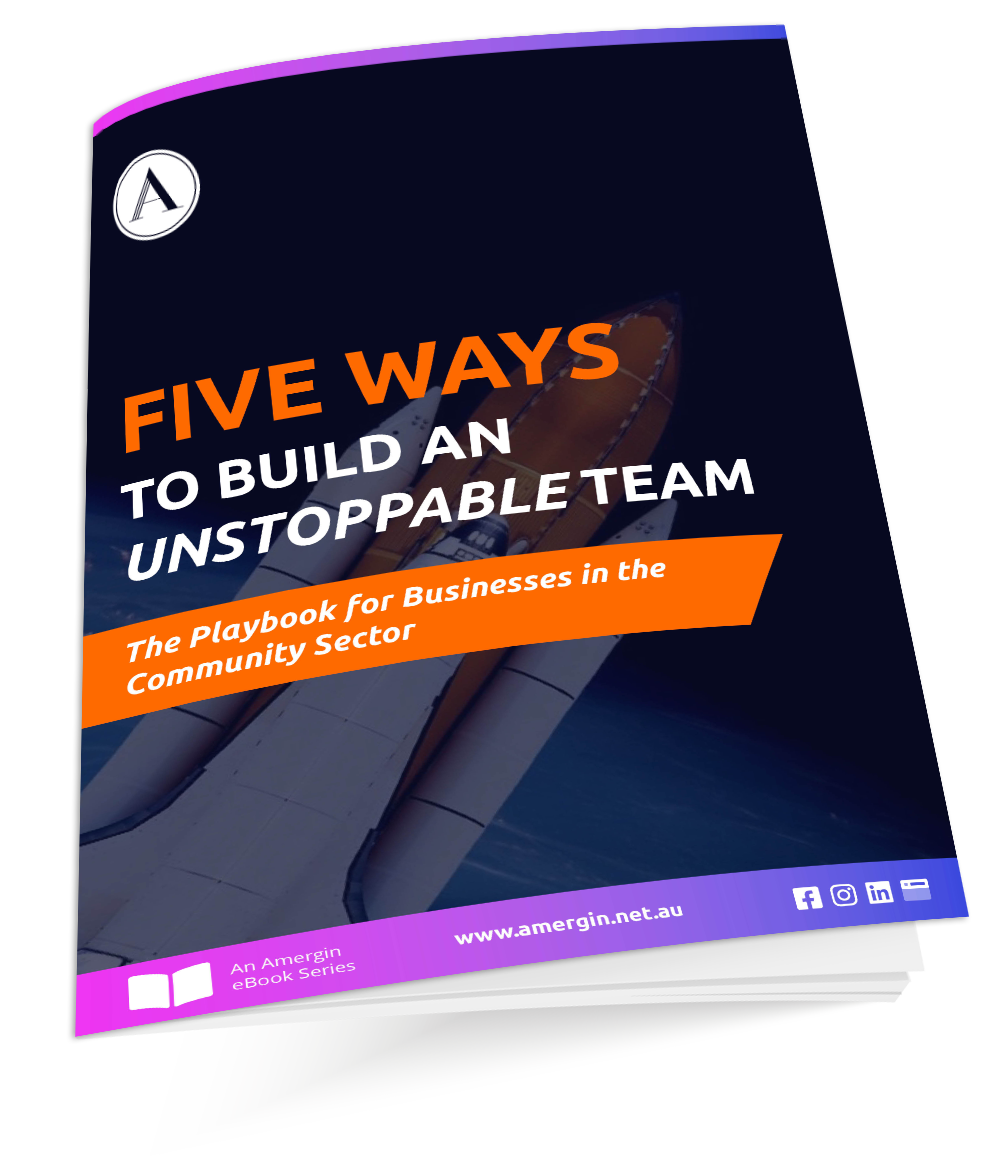The post Strategic and Operational Planning for 2022 and Beyond appeared first on Amergin.
]]>
What is your greatest business challenge? I’m not a mind reader (and far from it), but I’m confident you are thinking about an aspect of your business that is impacted by the COVID pandemic.
As Australia emerges from the latest lockdowns we are in the crosshairs of enormous challenges, but even greater possibilities! For example, the Australian Bureau of Statistics reported in June 2021 that 26% of businesses in the Healthcare and Social Service industry indicated they were having trouble finding suitable staff1. Given those statistics, are you comfortable providing your services with “unsuitable” staff? Or, with creative planning and strategic implementation, your company can be one that great staff will want to work with!
Success, triumph, and a sense of accomplishment require 3 things: a goal, an experience, and a measurable outcome. A Strategic and Operational Plan provides this structure for your business and your participants to succeed! In my 20 years of experience in social services, I’ve noticed very clearly that many businesses and services fail because of one thing…the failure to successfully implement great ideas with measurable outcomes. Don’t let this happen to you! Amergin wants to empower you to be impactful beyond your wildest dreams, by supporting you with your Strategic and Operational Plan, its implementation, and beyond.
Join our exclusive LIVE webinar: Strategic and Operational Planning for 2022 and Beyond and you will:
1Australian Bureau of Statistics, Business Conditions and Sentiments, June 2021, accessed 01/11/2021.
The post Strategic and Operational Planning for 2022 and Beyond appeared first on Amergin.
]]>The post Residential Aged Care and the NDIS – It’s Time to Work Together appeared first on Amergin.
]]>
The Australian Institute of Health and Welfare (AIHW) identified in the People with Disability in Australia (2020) report that 5,600 people under the age of 64 are in permanent residential aged care.
Of the 5,600 young people living in residential aged care (RAC), 72% require high supports in relation to changed behaviours and 88% have limitations with their self-care.
As we know, the Australian Government is committed to minimising the need for younger people to live in RAC facilities. Until such a time however (2025 as per the Younger People in Residential Aged Care – Action Plan), the aim is for NDIS participants living in RAC to receive regulated care and support as per NDIS legislation.
Queue 1st December 2020 and surprise, any RAC provider supporting an NDIS participant within their facility automatically became registered NDIS providers. A process that usually takes in excess of 6 months (sometimes much longer) and involves extensive assessments, audits, documentation and education.
RAC providers automatically became responsible for managing participants, ensuring to support them to exercise choice and control over their lives, including their participation in the NDIS and how they receive care and services.
Now, as a result, many have spent the past 8 months wondering how they turn themselves into an NDIS provider as well as meet the growing requirements they already have within aged care.
Where it becomes increasingly confusing is, NDIS participants living in RAC are dual participants of the NDIS AND Aged Care systems. This means they can access RAC funds for their accommodation and care but also use their NDIS funds as well.
While this is a great outcome for the NDIS participant, especially given their need for high supports, it is evident from the work Amergin have been doing recently that unfortunately, the two sectors are NOT working together to ensure this happens.
The majority of RAC providers are not familiar with how NDIS funding works, NDIS portal claiming, NDIS plans, Support Coordination, and Plan Management. Not to mention the significant differences between NDIS participant goal setting and those of an aged care resident. In their defense, why would they be? They have spent countless hours making sure they understand their own sector, legislation, and Standards. Combining the two is a substantial undertaking.
There is also the added layer of confusion being experienced by NDIS providers who co-support NDIS participants living in RAC. Support Coordinators and Plan Managers are key stakeholders involved in supporting NDIS participants to live the life they chose and assist them with goal setting, activity planning and how best to spend their allocated NDIS funds.
And while Aged and Community Services Australia (ACSA) have partnered with the NDIS Commission to create the RAC NDIS Support Hub, resources are still in development given the infancy of the initiative itself.
NDIS Support Coordinators are attempting to understand the Aged Care legislation however as Disability Services Manager, Kelli Payne and her team from Marsden Families Program identified recently, “We have done quite a bit of research ourselves but there appears to be a huge grey area when interpreting and applying the [aged care] legislation” when it comes to funding and responsibilities.
It was not until Amergin spent time breaking down the differences across the sector including funding responsibilities that the Support Coordinators at Marsden Families Program could “move forward with confidence”, said Ms Payne and ensure their NDIS participants living in RAC could utilise their plans and funds for the better.
So how can you combine forces?
Our advice; start working together and educating each other.
Of course, utilise the supports from ACSA, however as they continue to develop it’s important to also provide support to each other. After all, each of you are experts in your area/sector. You have the ability to explain complex legislation to each other and transfer it into direct service provision understanding.
Before developing care plans or budgets for care and services, engage each other for education, support to navigate the claiming portal and stakeholder/case conferences to make sure you are all on the same page (RAC and NDIS providers).
Ensure you understand just how an NDIS participant’s funds work within RAC and the NDIS plan. Cross billing can be challenging to understand and navigate therefore lean on each other to fill any knowledge gaps along the way.
Lastly, engage the support of education and consultation firms (such as Amergin) who specialise in, and therefore understand, both the Aged Care AND NDIS sectors. That way you receive tailored advice and guidance in areas such as service provision, funding and claiming, policy and procedure revisions, and audit support.
We really are all in this together and the ultimate aim is to ensure participants/residents receive the care and services they need and are entitled to, with as little disruption to your efficiencies and business processes as possible. It can be done!
Next Steps
For more information on the topic of NDIS participants in Residential Aged Care and how best to receive support as a provider, book a consult with the team at Amergin.
The post Residential Aged Care and the NDIS – It’s Time to Work Together appeared first on Amergin.
]]>The post Mental Health First Aid and the NDIS – Does Your Workforce Have the Right Skills? appeared first on Amergin.
]]>
What impact can Mental Health First Aid have on NDIS providers, their staff and their participants?
Market analysis of NDIS growth trends continually identifies psychosocial disability supports as an area in need of significant development (and need for participant support).
With many providers stepping into this space, it’s important to be able to set yourself apart from the others and make your business a leading provider.
Speaking from experience, one of the biggest issues with finding the right provider ‘fit’ for psychosocial participants is the staff’s capability for supporting people who have challenging behaviours. This goes further than just the use of restrictive practices; more commonly the skillset needed is being able to understand and respond to unpredictable and fluctuating needs.
To do this well, staff need to be confident, capable, and adaptive. Time and time again it’s become apparent that these aren’t skills that come naturally to everyone, but thankfully they are skills that can be taught.
Being able to be a leading provider in this space means employing staff who have expert skills such as:
It’s not about having staff that knows absolutely everything, but it is about having staff that can do their specific job well. These skills come from experience, and they also come from knowing the best practice approaches and with staff feeling capable and confident each day when they come to work. In my experience, it’s when staff are scared or unsure that avoidable mistakes occur.
This is where professional development/training in Mental Health First Aid can fill that gap.
Mental Health First Aid (MHFA) teaches staff how to assist people who are developing a mental health problem, experiencing a worsening of an existing mental health problem, or in a mental health crisis, until appropriate professional help is received, or the crisis resolves.
MHFA training can be delivered in a tailored way that provides your staff with the necessary skill sets that will ensure they can support participants with psychosocial disability.
As a result, you and your staff will have:
About Kimberley
Having worked in the mental health and disability sector for over a decade, Kimberly has found a passion for educating and training workers to be able to better support those living with a psychosocial disability.
Throughout her career, she has coordinated services and supports for people who have complex needs due to their psychosocial disability. As a result, she has become adept at identifying providers who have a competent workforce and has learnt what to look for and what to avoid.
Kimberly has experience working with organisations to tailor evidence-based training to their staff to work either with specific participants or certain participant profiles, such as those who have challenging behaviours related to their Personality Disorders.
Kimberly is also a qualified Standard Mental Health First Aid instructor and has over half a decade’s experience delivering MHFA courses to NGOs, public health staff, and government agencies. Kimberly takes pride in being able to purposefully target content based on the trainees’ needs and area of work so it can be easily applied into their practice.
Current Offer
2-day community-based Mental Health First Aid courses from $150 per staff member, and private 2-day courses from $1000 per course*.
To register for a Mental Health First Aid course or to learn more about how you can provide the best service possible to your participants, Email Kimberly or phone her directly on 0405 560 937.
*Please note the fee structure differs for online course delivery.
The post Mental Health First Aid and the NDIS – Does Your Workforce Have the Right Skills? appeared first on Amergin.
]]>The post Risk Assessments: What you need to know appeared first on Amergin.
]]>
Risk assessments are a hot topic at the moment, particularly in the NDIS, as auditors focus in on how providers are managing their risks. And their findings indicate there is quite a lot of room for improvement!
So why are risk assessments so important? Because it’s the law? Because the Standards or Quality Indicators say so? We all know that is partly the reason but mostly it is because doing a thorough and detailed risk assessment allows you to see areas of your business that may be exposed or could cause harm to others. This provides you with an opportunity to consider ways to reduce possible impacts if those situations were to happen; which can save you thousands of dollars, plenty of time, and may even prevent you losing your entire business. Not to mention preventing a lot of pain and anguish from injuries or illness that could have been avoided.
Over the last few years, I have observed many providers taking the time to understand and work with their clients to assess possible risks for them (as well as their home environment and in community settings). This has included documenting the risks and periodically reviewing them with their staff members, the client, and other stakeholders actively involved. And rightly so – client safety is fundamental to delivering any type of supports. It has also been refreshing to see that completing client risk assessments is becoming ‘the way we do things’, as opposed to ‘don’t forget to do that risk assessment thing!’
But what about other risks? How are you managing risks to your staff? And what about your organisation? When auditors are looking at how providers are managing risks, they are looking at 3 key areas:
As a provider, you have a responsibility to identify, assess and manage all of the above risk types.
Risk Assessments should include identifying what the potential risks might be, the current controls you have in place to prevent or minimise those risks, and what other actions you can put in place to further reduce the possible outcomes. Any follow-up actions should be allocated to a responsible person in the organisation (who has the appropriate authority to do so), to ensure the action is completed.
Here are my top 4 tips for completing risk assessments:
- Include your staff members, clients (where possible) and other stakeholders when conducting risk assessments. Not only is this part of health and safety law (employers must consult with employees), but it helps to create engagement and ownership over risk management processes. Getting everyone on-board with safety allows a team approach, not leaving responsibility to only a few individuals.
- Have a consistent approach to assessing risks. By using a risk matrix that is applied across the organisation, it allows management to prioritise what needs to be done and how quickly based on how high (or low) the risk scores are. There are several methods you can use, although a common way is to follow the AS ISO 31000:2018 Standards and I would recommend this.
- Make risk assessments a part of your processes and the usual way you do things. Just as client risk assessments have become an expected part of intake procedures, make organisational and staff risk assessments standard procedure. This could be as simple as allocating time as part of staff meetings and management meetings to discuss and review risk assessments or any concerns that have been raised in relation to risk (and documenting the outcomes).
- Don’t forget to review risk assessments when things change. It’s easy to think your risk assessments are complete once they are done, but they should be living documents and updated when things happen.
Now what about Dignity of Risk?
Becoming a more focussed topic within the community sector, respecting a client’s right to take risks falls within your risk assessment processes too. It is important for organisations and staff delivering services to understand the concepts of dignity of risk… but I’ll save that for another article 😊
Next Steps
Understanding how to assess, mitigate and manage risks within your organisation can be a minefield.
This is where Amergin can help.
Our experienced and qualified team can provide education and support to help you better understand how to identify and manage the risks within your organisation.
Contact one of our Social Impact Consultants to find out more today!
The post Risk Assessments: What you need to know appeared first on Amergin.
]]>The post Top 4 Care Management Systems | NDIS & Aged Care Providers appeared first on Amergin.
]]>This post was originally published in January 2018 and has now been updated to reflect the current provider environment.
As the NDIS and Aged Care sectors reform and expand, we are seeing a growing number of emerging Care Management Systems (CMSs) entering the market – each offering their own unique blend of functionality, sophistication and design.
While they differ in appearance and features, they all share a common desire to help service providers manage their operations, improve efficiencies and deliver transparency on areas like financials, staff activity and client care. So which one is right for your organisation?
Our team has direct experience in the sector using some of the most comprehensive and user-friendly systems available. Based on this we have put together our top 4 recommended platforms for comparison.
Top 4 Care Management Systems Comparison Table
| Name | Ideal For | Sector/s | Cost | Integration Inclusion | Australian Company | Setup Fee | Monthly Fees | Minimum Subscription | Discount Offers |
|---|---|---|---|---|---|---|---|---|---|
| Brevity | Small providers | NDIS, private aged care | Based on number of clients | Partial. | Yes | Yes | Yes | Yes | No |
| SupportAbility | Medium-sized service providers | NDIS | Based on number of staff | Partial (option to include more) | Yes | Yes | Yes | 12 Months | No |
| Lumary | Medium to large providers | NDIS, Aged Care (HCP), CHSP, DSS, DVA | Subscription | Comprehensive | Yes | NA | Yes | Yes | No |
| VisiCase | Established medium to large — service providers. * Fast Start for smaller providers |
Aged Care, NDIS, employment, mental health and language services | Based on number of clients | Comprehensive with advanced module integration | Yes | Yes | Yes | 3 Years | YES! Join Amerginhub |

Brevity
Why you’ll love it
If you’re an NDIS provider; smaller in size; and have a tight budget, then Brevity could be for you. Even better it’s easy to use, has all the key functions you need to operate at a base level including support around client record management, HR modules, rostering and even some reportable analytics.
In short, yes, it does the job. Does it have the full automation that other systems have? No. But you wouldn’t expect that with the price you’re paying. It’s also great for providers who do support coordination, plan management & high intensity personal activities (clinical care) and private/brokered Aged Care (Home Care) services.
Be aware
Whilst it has the functionality you need to operate, you’ll find like an emerging wine connoisseur, your taste is likely to change as your business grows. The wine that you once liked doesn’t quite satisfy your needs anymore. You start to look for improved quality and substance. You want to tick more boxes. This is where Brevity can fall over for some providers — not being able grow and adapt as your business grows and demands more.
Summary
Brevity is a great first or second stone that represent the steps of growth in your business. Some providers don’t want to see massive growth, particularly sole traders or services operating in smaller regions — in these contexts, Brevity does the job. For those who have a bigger picture in mind, then consider a platform that is able to adequately grow with you — particularly if you have multiple sites, lots of staff and a more complex operational framework.


SupportAbility
Why you’ll love it:
SupportAbility is a cloud-based platform specifically developed for the Australian disability sector – the National Disability Insurance Scheme (NDIS).
The platform allows providers to assess participant goal progress and support the changing needs of participants over time as well as plan, monitor and report on their funding. It comes with some solid reporting tools, with in-build functionality to make sure staff are recording everything they need to and following process. Providers can also track progress and report back to the NDIS which supports evidence-based service delivery.
While SupportAbility offers all the standard administrative tools like staff rostering and client scheduling, the platform includes a unique Human Resources module to support staff professional development and promote best practice. The platform houses a good range of financial and reporting tools including full NDIS funding and budget management tools. An online learning centre means service providers are able to learn the system quite easily.
The platform houses a good range of financial and reporting tools including full NDIS funding and budget management tools. An online learning centre means service providers are able to learn the system quite easily.
Be aware:
Having a platform that’s built to support organisations operating in a specific sector is great but has obvious disadvantages for organisations who are, or intend to, diversify their services across other sectors such as Aged Care, Child Care or Employment.
SupportAbility does have some very basic lead nurturing and marketing features, however, its primary purpose is care management. In addition to this, while SupportAbility can handle care management for clients in other sectors it does not manage billing or reporting and integrations for anything other than disability services.
Summary:
SupportAbility offers a well-packaged platform, specifically designed for NDIS service providers. Amongst the list of other Care Management Systems available in Australia, SupportAbility sits (and is priced) somewhere in the middle.
The platform offers a great suite of features, designed to support evidence-based service delivery within a quality management framework. This works well for both clients (participants) and being cloud based, provides transparency for both staff and clients.


Lumary
Why you’ll love it:
Lumary (as featured in SmartCompany) is one of the most exciting and fastest growing Care Management System used across both the Disability and Aged Care sectors — and it’s not by chance.
First up, Lumary has done its homework. Instead of mirroring many other systems, the platform has been imagined entirely from the ground up whilst leveraging the power of one of the World’s leading CMS providers, Salesforce. It also focusses on some serious efficiencies around workflow, operations, claiming and other key areas.
Further, Lumary’s completely cloud-based platform also reflects updates within its platform when compliance requirements change, this includes pricing. Whilst it doesn’t provide state and federal regulatory updates or your business’ policies and procedures to govern your operations, the team ensures you are operating within a compliant environment.
Aged Care providers have the added benefit or being able to utilise an interface with the Federal Government’s Services Australia for improved claiming processes.
Be aware:
It’s a great, intuitive system that give you remarkable transparency over their business, it does come with a price tag. This is why Lumary is most suitable for fast growing, profitable (and generally larger) organisations who have the budget to invest in such as system.
Summary:
We’ve all done it. Walked into a vehicle show room, seeing the car of your dreams and then seeing the price tag and cringing. If nothing else, it’s worth getting a demo and weigh up the benefits versus the cost and see if it’s a good fit.


VisiCase
Why you’ll love it:
Visicase is a comprehensive, cloud-based care management platform that ticks all the boxes (plus quite a few more). What I particularly like about Visicase is the attention to smaller details with a significant emphasis on streamlining workflow and automating processes. The Platform comes with integrated rostering, accounting and finance interfaces so you don’t need to worry about mix-and-matching other software. It’s also supported by a powerful workflow engine that keeps track of what needs to be done and by whom.
The platform boasts a user-friendly client portal that provides access to their secure portal so they take an active part in care planning and given transparency of their plan progress, tasks and budgets.
The final big tick comes from the Platform’s adaptability. Unlike other systems, VisiCase’s Platform is not confined to a single market environment, but rather has built in multi-sector proficiency. With a growing number of businesses choosing to extend services from just disability to also include aged care, employment (and more), this is a real benefit.
Be aware:
It’s hard to find flaws with systems as comprehensive and feature-packed as this one — but that’s exactly where it fails to address some business needs. It’s hard to ignore the point that Visicase has stormed ahead with system sophistication and automation. Where it can become difficult is in the pricing — additional modules mean more money. There can also be a significant setup fee, but this also depends on the size and complexity of your organisation.
Summary:
Visicase is an impressive, multifunctional Care Management System that offers an ‘all-in-one’ solution for your organisation. It allows streamlining of remedial tasks, optimisation of resources and greater transparency on your broader operations. VisiCase does a good job at enabling individual care planning and budgeting as well as measuring progress towards desired outcomes.
With advanced integration facilities, intuitive workflow management and customisation, it’s really an all-in-one care management system that breaks many boundaries, making it very difficult to compete with.

How do you choose?
When choosing what system is right for you, make a list of the main functions and features that are important to you in a CMS. Because there is such a wide range of options available, we recommend getting details and quotes from at least 3 potential CMS systems.
Key things to consider in determining the right system for you:
If you’re interested in one of the above Care Management Systems, members of Amerginhub are given access to exclusive discounts.
Amerginhub is also your gateway to ongoing compliance community sector updates and much more!
The post Top 4 Care Management Systems | NDIS & Aged Care Providers appeared first on Amergin.
]]>The post Navigating the ECEI Labyrinth – What’s Ahead for ECEI Providers appeared first on Amergin.
]]>
What’s Ahead for ECEI Providers and Why it is Important for Families and Children
Grief, confusion, uncertainty, denial, frustration, worry, guilt, stress… just a few of the many emotions parents and families confront when their young child experiences developmental challenges or has a disability.
Trying to find the right support for a child can be like navigating a labyrinth. One key question of course is ‘What’s going on?”. The next is often ‘What do we do about it?”. The answer is commonly dictated by whether the child meets the diagnostic thresholds required to obtain government-funded support – an expensive exercise involving numerous visits to a variety of specialists.
Over the last 14 years we have seen increasing recognition of the challenges faced by parents and families in this situation, met with responses such as programs like Helping Children with Autism and Better Start for Children with Disability, through to a dedicated Early Childhood Early Intervention (ECEI) approach in the NDIS. However, there is still a way to go. 2019’s Tune Review put it well:
Further attention should be given to developing a model of planning for children that is more streamlined and provides more structured support for families early in their experience with the NDIS, in a way that prepares them for taking full control later in their NDIS journey. While the long-term aims of the NDIS are clear, more efforts need to be made to support parents and children on the journey from initial inexperience, stress, and disempowerment to being able to exercise informed choice and control.
On the back of numerous reviews and enquiries, including the Tune Review, and an Information Paper subsequently released by the Federal Government last year, the NDIA is now looking to make improvements to the NDIS’ ECEI approach, shaped around 23 recommendations (provided in full below this article). In amongst some big-ticket policy changes such as increasing the age limit for children supported under the approach to up to 9 years old, and having Early Childhood Partners conduct Independent Assessments to determine eligibility and budgets for children over 12 months of age, NDIS providers delivering Early Childhood Supports should take particular note of the following Recommendation:
Recommendation 6: Consider a range of mechanisms that will enhance compliance of providers with the NDIS Practice Standards on Early Childhood Supports and increase awareness by families of providers that adopt that best practice framework.
This recommendation is a response to three key issues1:
- industry concerns that many ECEI providers in the industry are not following best practice standards
- 80% of families and carers of young children are either self-managed or plan-managed, meaning they have the choice of using non-registered ECEI providers who do not have to demonstrate compliance with minimum standards like registered providers do, and
- families have limited knowledge of which ECEI providers are following ECEI best practice and how to find this out.
The recommendation essentially puts ECEI providers – unregistered and registered – on notice: a push for greater NDIS and ECEI best practice compliance – and better transparency around these – is coming.
Consultation currently underway is seeking feedback on how to make this a reality. Ideas put forward in the consultation papers2 include:
- providing better information to families about the benefits of using providers registered with the NDIS Commission
- establishing an industry-led ‘best practice accreditation system’
- establishing a quality feedback or rating system’
- making registration with the NDIS Commission mandatory for all ECEI providers, and
- requiring self and plan-managed participants accessing ECEI support to use only registered ECEI providers.
While the future hasn’t been written yet, it’s clear that whatever happens, ECEI providers need to be prepared to clearly demonstrate how they comply with both NDIS requirements, as well as ECEI best practice standards, regardless of whether they are formally registered with the NDIS Commission or not. And while this is only one policy response out of over 20, it is absolutely necessary, in order to provide stressed and anxious families with the clarity and assurance they need to make empowered choices for them and their child.
The good news is that the current consultation process is still open, giving providers an opportunity to contribute to and shape the approach they’ll need to work within. Submissions close on Tuesday 23 February 2021.
1Early Childhood Early Intervention (ECEI) Implementation Reset – Project Consultation Report, National Disability Insurance Agency (NDIA), November 2020
2Supporting young children and their families early, to reach their full potential, National Disability Insurance Agency (NDIA), November 2020
The post Navigating the ECEI Labyrinth – What’s Ahead for ECEI Providers appeared first on Amergin.
]]>The post NDIS Provider Marketing: 3 Things You Can Do Right Now to Get a Competitive Advantage appeared first on Amergin.
]]>
Whether you’re an established provider, or just starting out, NDIS Provider Marketing will play a key role in all strategic planning efforts for your business.
With the growth of the scheme continuing at a steady pace as we head into 2021, there’s no shortage of providers looking to capture their share of the market. What this means for participants is what the scheme set out to achieve – A greater level of access for people with disability. What this means for you however is simple – more competition.
So… what can you do to help set yourself apart from the competition? How do you even know who your direct competition is? Have you taken the time look? For many, the term ‘marketing’ is one that brings a feeling of dread and worry, resulting in it being dumped in the ‘too hard’ pile and left for later. The problem is – while you’re waiting for later, your competitors are capitalising.
Now don’t get me wrong, Marketing does not have to be your strong suit – there are professionals that can help when the time comes. But as a small business owner, it’s important to at least get an understanding of some of the fundamentals. And – you’ll be relieved to know – there’s a few things you can be doing right now to help give you a competitive advantage. Here’s a few to get you started.
3 NDIS Provider Marketing Tips
01. Competition Analysis
Start by taking a look at your closest competitors. There’s a good chance if you’ve been operating for a little while that you might already be aware of a few. Even so, an important part of staying competitive is staying ahead. While marketing agencies and the like go into incredible detail when conducting a competition analysis, we’ll keep things simple for now. Open google in a new tab and search some keywords related to your business. Some examples include:
- ndis provider near me
- ndis provider [your location]
- [your location] ndis providers
- [service name] near me
- ndis [service name] [your location]
Continue to make a list of these keywords and phrases that relate to your business and services that you can search for at any time. For results that start to pique your interest, note them down in a spreadsheet for easy reference and safe keeping. Now, start asking yourself the following questions and add the answers in as separate columns alongside each competitor.
- How many employees do they have?
- What services do they provide?
- How many locations do they have?
- What is their pricing model?
- What are their selling points?
- What social media channels are they present on?
- How do they engage with their audience?
- What is your point of difference?
Congratulations – You’ve just started compiling your very first competitor analysis! Continue checking back and adding to your spreadsheet over time and you’ll be amazed at what you’ll find. Whilst this is just the tip of the iceberg when it comes to conducting a competition analysis, it’s a great first step to getting proactive in your NDIS Provider Marketing efforts.
02. Conduct Your Own SWOT Analysis
You may have come across the term SWOT Analysis before, but have you conducted one for your own business? If not, it’s a great way to take a critical look at your business to take stock of your current situation and help identify where improvements can be made. A SWOT analysis consists of the following parts:
- S – Strengths
- W – Weaknesses
- O – Opportunities
- T – Threats
Sit down with your team and brainstorm each of the four categories in detail. Some questions to start asking yourself could include:
Strengths
- What do you do well?
- What is your point of difference against competitors?
- What resources and staff do you have available?
Weaknesses
- Where are you lacking?
- What advantage/s does your competition have over you?
- Do you have any limitations?
Opportunities
- Is there an emerging need for our services?
- Have we received any good press or media coverage?
- Is competition in our region low?
Threats
- Who are our competitors? (See ‘Competition Analysis’)
- Are there any emerging competitors we are aware of?
- Is the operational landscape changing or evolving?
- Can we keep with and meet demand?
- Are our clients happy with our services?
SIC TIP Social Impact Consultant Tips – Ready to step up your game? Try conducting a SWOT analysis for each of the businesses listed in your competitor analysis and cross reference with your own. Have you identified any gaps that need to be filled?
03. Follow the Data
When it comes to Marketing, data is your friend. Having a good understanding of what data is available to you – and how to read that data – is going to give you a huge advantage. The source of this data is going to be different for every business, but your past and present clients are a great starting point. Ask yourself:
- How did they find your services?
- Are they happy with your service offering?
- Where are they located?
- What made them come to you over another provider?
The great thing about utilising online tools to assist with your NDIS provider Marketing efforts is that they all generally come with reporting functionalities.
- Do you have a website? Ensure that Google Analytics is in place and tracking user engagement.
- Do you utilise a CRM? Set up Weekly and Monthly reports to help get a snapshot of your database
- Are you on Social Media? Start analysing the audience tools to find out demographic information, interests and more when people engage with your page.
The more time you take to understand this data, the more you’ll understand how to market your business and differentiate your services from competitors.
Wait, I want to find out more!
If you want to get started on developing a Strategic Plan to drive your business forward, you can download our Free 2021 Strategic Planning Guide for Community Businesses
Just click the link and enter your details and we’ll send it to your inbox.
It’s specifically tailored for community businesses who want to move forward and need a plan to get there. It will help set your priorities and goals to reach your Vision and navigate change so you don’t feel held back.
The post NDIS Provider Marketing: 3 Things You Can Do Right Now to Get a Competitive Advantage appeared first on Amergin.
]]>The post WA NDIS Transition to National Framework Begins appeared first on Amergin.
]]>
The WA NDIS Transition has begun! From 1 December 2020, Registered NDIS Providers operating in Western Australia (WA) were able to start renewing their registrations with The NDIS Quality and Safeguards Commission (The NDIS Commission).
This is not only significant for NDIS Providers who are now required to comply with the National NDIS Practice Standards, but also for the NDIS Commission who now oversees ALL providers across all States and Territories.
The transition was delayed due to the COVID-19 epidemic. Earlier this year, WA providers requested that the transition be deferred to allow them to focus on critical support issues for people with disability during the initial phase of COVID-19 and a subsequent recovery period.
Here’s Our Top 5 Things Providers Need To Know About the WA NDIS Transition
1. What are the main changes I should be aware of?
The NDIS Quality and Safeguarding Framework presents several key differences that providers need to be aware of. These include a new NDIS Code of Conduct and NDIS Practice Standards, which set out expectations for the quality and safety of the services and supports providers deliver.
There have also been changes to provider registration and the way complaints are made, incidents are reported, behaviour support plans are developed and checked, and worker screening is undertaken. Unregistered providers are also subject to new requirements including the NDIS Code of Conduct and complaints handling arrangements.
You will also need to know whether you’ll need to go through Verification or Certification process – our VeriCert Pilot will help you do this easily.
2. How do I start renewing my registration?
You should have received a letter from the NDIS Commission inviting you to renew your registration through their online portal.
Our tips before you start the renewal:
- Familiarise yourself with the NDIS Practice Standards.
- Update your organisation’s policies and procedures as soon as possible so they meet the new National Practice Standards.
- Make sure you don’t start your self-assessment until you’re ready – once you’ve started, you only have 60 days to complete it.
3. Will I need to do an audit straight away?
No, you won’t need to do an audit immediately. You will be generally be given timeframe that you must start the renewal process. From there, you will be given further time to book and complete your audit.
4. Where can I get more information?
You can find more information and resources, including the NDIS Practice Standards and NDIS Code of Conduct, on the NDIS Commission website. You can also contact the NDIS Commission at 1800 035 544.
5. How Can Amergin help me renew my registration?
Our team are experts in NDIS registration and renewal and below are two ways we can help.
| Show me how to do it myself | I’m Too Busy – Please Help! |
|---|---|
|
If you have some time on your hands, we’ve put everything in one place (on amerginhub) to help you renew yourself.
|
We get it, you’re busy being the best provider you can be. We can do the heavy lifting for your and whilst guiding you through the entire renewal process plus provide a range of other business services.
|
The post WA NDIS Transition to National Framework Begins appeared first on Amergin.
]]>The post Why Your Team Culture is Eating Your Strategy for Breakfast appeared first on Amergin.
]]>
It’s no secret that without a business strategy, you don’t get results. Your strategy is your map to achieving your objectives and your vision. But here’s the thing – your team culture eats your strategy for breakfast.
Does that sound familiar? “Culture eats strategy for breakfast” was made famous by well-known management expert, Peter Drucker.
When you break it down, it means no matter how powerful your strategy is, its success relies on the people who deliver it.
When you have an engaged, high-performing team, your business thrives. Your team are aligned with the values and direction of your business and want to go the extra mile.
However, when your team is showing unhealthy signs, not only is your strategy impacted, so is your team morale, your client services and your bottom line.
The signs of an unhealthy team culture aren’t always obvious.
They can start off small – an under-performing team member isn’t making progress or poor client feedback is starting to become more regular. When you don’t have the right strategy to manage these, the problems can escalate.
There are five ways you can nip these issues in the bud and transform your team into a high-performing one.
To get started, download your free copy of our community sector playbook, Five ways to build an unstoppable team.
It will walk you through the mistakes to avoid and the changes you can start making today to build a high-performing team and accelerate results in your business.
And if like many businesses your strategy has taken a hit this year, or gone out the window, you can get your free 2020 Strategic Planning Guide to drive your business forward with certainty and clarity.
With a high performing team and a solid strategy, you’ll have a winning combo to charge into 2021 in full swing!
Where do I start?
If you want to get started on building a high performing team that are engaged and productive, you can download our Free eBook – Five Ways to Build An Unstoppable Team
Just click the link and enter your email address and we’ll send it to your inbox.
If your staff are disengaged or underperforming, you’re battling a tense work environment culture or you’re struggling with poor customer service, it’s a sign you may be dealing with an unhealthy team.
The post Why Your Team Culture is Eating Your Strategy for Breakfast appeared first on Amergin.
]]>The post NDIS Provider Insurance: Five Things You Need to Know appeared first on Amergin.
]]>
NDIS organisations across Australia work in a wide variety of settings and are exposed to a number of unique obligations and risks.
For providers operating in disability and/or aged care, it’s particularly important to be proactive in managing these risks. Yes, you need policies and procedures to govern your operations and great training to help your staff put these into practice.
Even with well-considered risk management strategies, there is the potential for all kinds of things to go wrong and sometimes unpredictable operating environments.
Here’s five reasons why NDIS Providers need insurance that not only protects their business but understand the environment they operate in.
5 Reasons for obtaining Good NDIS Provider Insurance
- Your service is fundamentally different than other business in terms of the services you offer, how you deliver them and ultimately the level of risk you face. It’s important your business insurance covers for what you need.
- The NDIS Quality and Safeguards Commission requires all Registered Providers to have a certain level of insurance including professional indemnity and public liability. You may need additional cover, particularly if you are providing services like complex clinical care.
- Insurance can protect you against a significant business disruption to your business. Should an unexpected event bring your business to a halt, you can stay on top of bills to keep things running.
- Mistakes or malpractice can happen even to the most vigilant providers. Failure to secure adequate insurance cover could lead to substantial financial penalties, lawsuits and even result in forced closure.
- Protection against cyber breaches. In administering disability services, a lot of personal and sensitive client data may be stored. This makes it essential to have excellent computer security practices and to comply with privacy legislation, as well as to have cyber liability cover in case of breaches.
To help our clients manage their insurance needs, Amergin (through amerginhub) is proud to announce a partnership with Reliance Partners Insurance Brokers, one of Australia’s leading insurance brokerage services.
Amergin has chosen to work alongside Reliance Insurance Partners because they get the community sector and will work hard to understand your needs, future plans and associated risks. They’ll also make sure you’ve covered for what you need and find you the best quote from a large selection of leading Australian insurers.
If you’re an amerginhub member you will also have a dedicated Advisor at your fingertips!
Get the best deal on Insurance
Are you in need of a quote or want to see if you’re getting the best deal on your NDIS Provider Insurance? Sign up to amerginhub to obtain an immediate referral, or Contact our team today for more details.
The post NDIS Provider Insurance: Five Things You Need to Know appeared first on Amergin.
]]>
